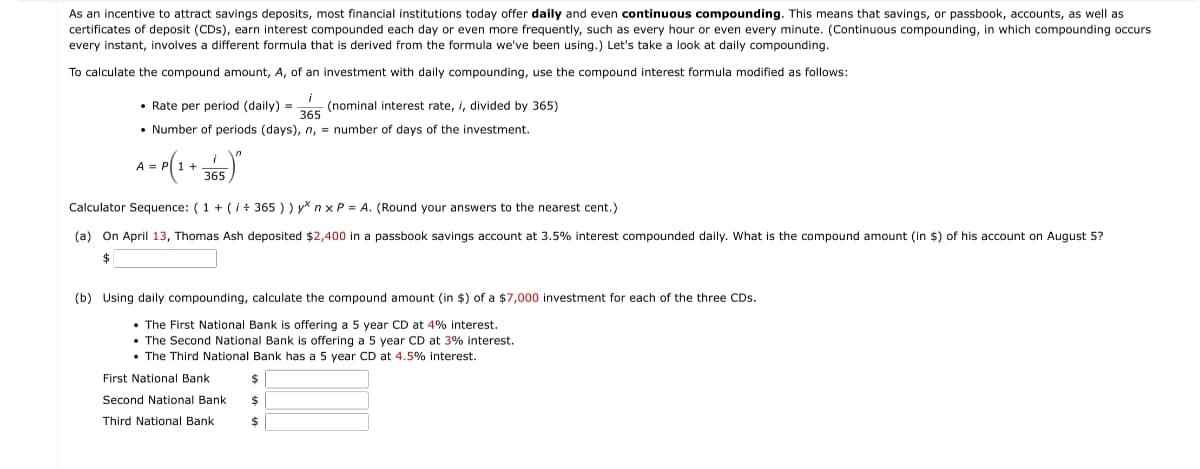certificates of deposit (CDs), earn interest compounded each day or even more frequently, such as every hour or even every every instant, involves a different formula that is derived from the formula we've been using.) Let's take a look at daily comp To calculate the compound amount, A, of an investment with daily compounding, use the compound interest formula modifie Rate per period (daily) (nominal interest rate, i, divided by 365) 365 • Number of periods (days), n, = number of days of the investment. A = P(1 + 365 Calculator Sequence: (1 + (i+ 365 ) ) y* n xP = A. (Round your answers to the nearest cent.) (a) On April 13, Thomas Ash deposited $2,400 in a passbook savings account at 3.5% interest compounded daily. What is 24 (b) Using daily compounding, calculate the compound amount (in $) of a $7,000 investment for each of the three CDs. • The First National Bank is offering a 5 year CD at 4% interest. • The Second National Bank is offering a 5 year CD at 3% interest. The Third National Bank has a 5 vear CD at 4.5% interest.
certificates of deposit (CDs), earn interest compounded each day or even more frequently, such as every hour or even every every instant, involves a different formula that is derived from the formula we've been using.) Let's take a look at daily comp To calculate the compound amount, A, of an investment with daily compounding, use the compound interest formula modifie Rate per period (daily) (nominal interest rate, i, divided by 365) 365 • Number of periods (days), n, = number of days of the investment. A = P(1 + 365 Calculator Sequence: (1 + (i+ 365 ) ) y* n xP = A. (Round your answers to the nearest cent.) (a) On April 13, Thomas Ash deposited $2,400 in a passbook savings account at 3.5% interest compounded daily. What is 24 (b) Using daily compounding, calculate the compound amount (in $) of a $7,000 investment for each of the three CDs. • The First National Bank is offering a 5 year CD at 4% interest. • The Second National Bank is offering a 5 year CD at 3% interest. The Third National Bank has a 5 vear CD at 4.5% interest.
Essentials Of Investments
11th Edition
ISBN:9781260013924
Author:Bodie, Zvi, Kane, Alex, MARCUS, Alan J.
Publisher:Bodie, Zvi, Kane, Alex, MARCUS, Alan J.
Chapter1: Investments: Background And Issues
Section: Chapter Questions
Problem 1PS
Related questions
Question
100%
Please answer both subparts.
I will really upvote.
If you unable to solve both then please solve only (b).
Thanks

Transcribed Image Text:As an incentive to attract savings deposits, most financial institutions today offer daily and even continuous compounding. This means that savings, or passbook, accounts, as well as
certificates of deposit (CDs), earn interest compounded each day or even more frequently, such as every hour or even every minute. (Continuous compounding, in which compounding occurs
every instant, involves a different formula that is derived from the formula we've been using.) Let's take a look at daily compounding.
To calculate the compound amount, A, of an investment with daily compounding, use the compound interest formula modified as follows:
• Rate per period (daily) =
i
(nominal interest rate, i, divided by 365)
365
• Number of periods (days), n, = number of days of the investment.
A =
365
Calculator Sequence: ( 1 + (i+ 365 ) ) y* n x P = A. (Round your answers to the nearest cent.)
(a) On April 13, Thomas Ash deposited $2,400 in a passbook savings account at 3.5% interest compounded daily. What is the compound amount (in $) of his account on August 5?
(b) Using daily compounding, calculate the compound amount (in $) of a $7,000 investment for each of the three CDs.
The First National Bank is offering a 5 year CD at 4% interest.
The Second National Bank is offering a 5 year CD at 3% interest.
• The Third National Bank has a 5 year CD at 4.5% interest.
First National Bank
Second National Bank
2$
Third National Bank
$
Expert Solution
This question has been solved!
Explore an expertly crafted, step-by-step solution for a thorough understanding of key concepts.
Step by step
Solved in 2 steps

Knowledge Booster
Learn more about
Need a deep-dive on the concept behind this application? Look no further. Learn more about this topic, finance and related others by exploring similar questions and additional content below.Recommended textbooks for you

Essentials Of Investments
Finance
ISBN:
9781260013924
Author:
Bodie, Zvi, Kane, Alex, MARCUS, Alan J.
Publisher:
Mcgraw-hill Education,



Essentials Of Investments
Finance
ISBN:
9781260013924
Author:
Bodie, Zvi, Kane, Alex, MARCUS, Alan J.
Publisher:
Mcgraw-hill Education,



Foundations Of Finance
Finance
ISBN:
9780134897264
Author:
KEOWN, Arthur J., Martin, John D., PETTY, J. William
Publisher:
Pearson,

Fundamentals of Financial Management (MindTap Cou…
Finance
ISBN:
9781337395250
Author:
Eugene F. Brigham, Joel F. Houston
Publisher:
Cengage Learning

Corporate Finance (The Mcgraw-hill/Irwin Series i…
Finance
ISBN:
9780077861759
Author:
Stephen A. Ross Franco Modigliani Professor of Financial Economics Professor, Randolph W Westerfield Robert R. Dockson Deans Chair in Bus. Admin., Jeffrey Jaffe, Bradford D Jordan Professor
Publisher:
McGraw-Hill Education